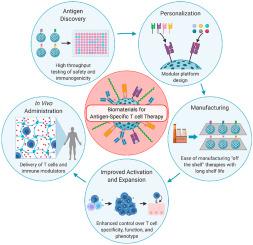Biomaterials ( IF 12.8 ) Pub Date : 2020-12-05 , DOI: 10.1016/j.biomaterials.2020.120584 Ariel Isser 1 , Natalie K Livingston 2 , Jonathan P Schneck 3

|
T cells are often referred to as the ‘guided missiles’ of our immune system because of their capacity to traffic to and accumulate at sites of infection or disease, destroy infected or mutated cells with high specificity and sensitivity, initiate systemic immune responses, sterilize infections, and produce long-lasting memory. As a result, they are a common target for a range of cancer immunotherapies. However, the myriad of challenges of expanding large numbers of T cells specific to each patient's unique tumor antigens has led researchers to develop alternative, more scalable approaches. Biomaterial platforms for expansion of antigen-specific T cells offer a path forward towards broadscale translation of personalized immunotherapies by providing “off-the-shelf”, yet modular approaches to customize the phenotype, function, and specificity of T cell responses. In this review, we discuss design considerations and progress made in the development of ex vivo and in vivo technologies for activating antigen-specific T cells, including artificial antigen presenting cells, T cell stimulating scaffolds, biomaterials-based vaccines, and artificial lymphoid organs. Ultimate translation of these platforms as a part of cancer immunotherapy regimens hinges on an in-depth understanding of T cell biology and cell-material interactions.
中文翻译:

生物材料可增强癌症免疫治疗中抗原特异性 T 细胞的扩增
T 细胞通常被称为我们免疫系统的“制导导弹”,因为它们能够运输到感染或疾病部位并在其处积聚,以高特异性和敏感性破坏受感染或突变的细胞,启动全身免疫反应,消灭感染,并产生持久的记忆。因此,它们是一系列癌症免疫疗法的共同目标。然而,扩增大量针对每位患者独特肿瘤抗原的 T 细胞面临着无数挑战,这促使研究人员开发出替代的、更具规模化的方法。用于扩增抗原特异性 T 细胞的生物材料平台通过提供“现成的”模块化方法来定制 T 细胞反应的表型、功能和特异性,为个性化免疫疗法的大规模转化提供了一条道路。在这篇综述中,我们讨论了用于激活抗原特异性 T 细胞的离体和体内技术开发的设计考虑因素和进展,包括人工抗原呈递细胞、T 细胞刺激支架、基于生物材料的疫苗和人工淋巴器官。这些平台最终能否成为癌症免疫治疗方案的一部分取决于对 T 细胞生物学和细胞与材料相互作用的深入了解。











































 京公网安备 11010802027423号
京公网安备 11010802027423号